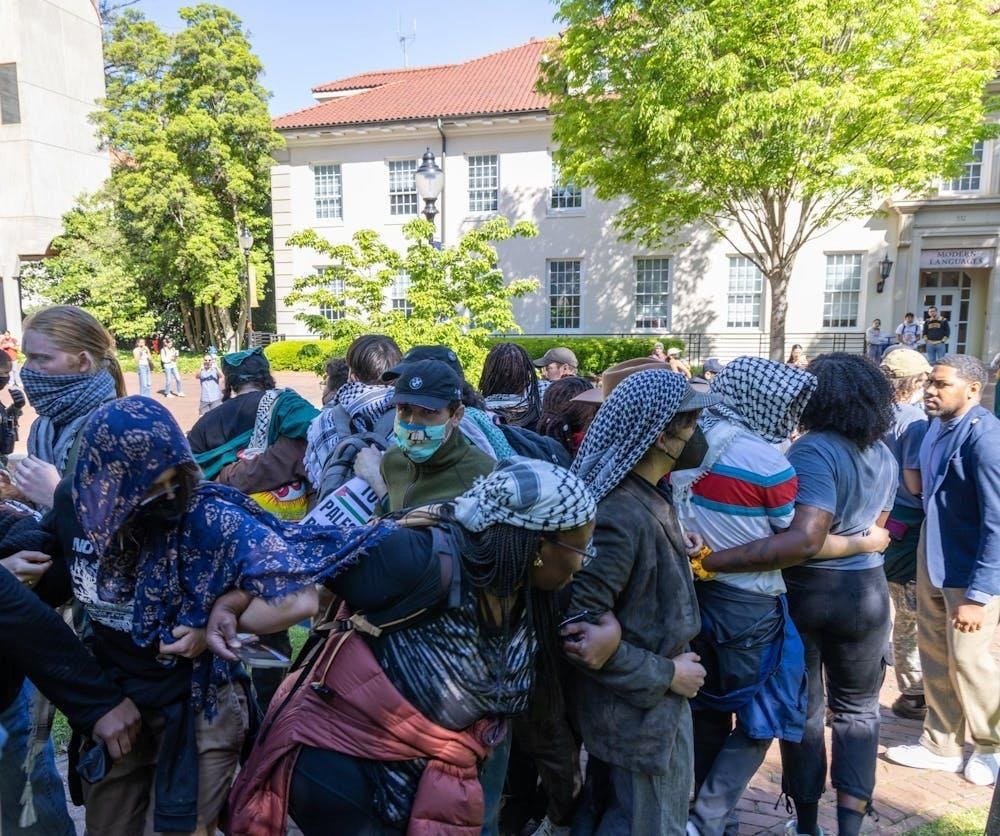Nine months after law enforcement agencies arrested 20 Emory University community members at a pro-Palestinian encampment, U.S. President Donald Trump issued an executive order aiming to deport non-citizens who participated in pro-Palestinian protests, which a White House fact sheet described as “pro jihadist” demonstrations. One of 45 executive orders, the Jan. 29 directive promises to “combat the explosion of anti-Semitism” by deporting and canceling the student visas of “Hamas sympathizers.” While the legal statuses of the arrestees are unknown, the order outlined has the potential to threaten Emory students.
While Emory declined to provide additional information the Jan. 29 executive order, Executive Vice President for Health Affairs Ravi Thadhani and Interim Provost Lanny Liebeskind wrote in a Jan. 28 email to the Emory community that the University is working to understand recent government directives, including Trump’s attempt to freeze federal funding. Thadhani and Liebeskind wrote that they will communicate additional information as it becomes available.
“Many specifics remain unknown,” Thadhani and Liebeskind wrote. “We understand that many of you are concerned about the impact of these changes on your academic and research pursuits. We have received your messages and share your concerns.”
Trump’s references to increased antisemitism likely refer to an escalation in antisemitic attacks following the start of the Israel-Hamas war. The Anti-Defamation League’s (ADL) Center on Extremism reported that from Oct. 7, 2023 to Sept. 24, 2024, antisemitic incidents increased by over 200% compared to the year prior.
Eagles for Israel did not respond to The Emory Wheel’s request for comment on the executive order. However, in the larger Jewish community, leaders have both praised and condemned the executive order.
Rabbi Steven Burg, CEO of the Jewish educational non-profit Aish, commended Trump’s executive order for addressing the threat of “pro-Hamas” students.
“There is a very real threat posed to U.S. colleges by those who support terrorist organizations like Hamas,” Burg told Fox News Digital. “Many Jewish students have been living in fear for more than a year.”
However, CEO of the Jewish Council for Public Affairs Amy Spitalnick contended that actions like this tend to erode democratic values.
“It is both possible and necessary to directly confront and address the crisis of antisemitism, on campus and across our communities, without abandoning the fundamental democratic values that have allowed Jews, and so many others, to thrive here,” Spitalnick said in a statement.
Anti-Muslim sentiment also increased in the months following Oct. 7, 2023, with a report by the Council on American-Islamic Relations (CAIR) finding that in the first half of 2024 there was a 69% increase in anti-Muslim hate crimes. At Emory, the Georgia chapter of CAIR and Palestine Legal filed a lawsuit on behalf of Emory Students for Justice in Palestine (ESJP) to address potential violations of Title VI of the Civil Rights Act of 1964.
ESJP President Ibrahim, who requested to be identified by his first name due to safety concerns, said the executive order was “not a surprise.”
However, Ibrahim said that most ESJP members are U.S. citizens and that international students involved in ESJP are aware of the risk of protesting directly. Ibrahim said the University is working with international students who may be affected by the executive order to ensure they are safe and have a plan if U.S. Immigration and Customs Enforcement visits campus. The Office of International Student and Scholar Services declined to provide additional information.
“There’s always ways that you can be an effective protestor or advocate without taking risks,” Ibrahim said. “But always keep your safety in mind first.”
Ibrahim said he saw some students “celebrate” the executive order, which disheartened him. In the context of Trump’s other recent actions regarding immigration, Ibrahim said he was concerned this rhetoric would promote xenophobia on campus.
“I thought that the Emory community has really taken a stance against Trump and against his racist and Islamophobic laws and executive orders and rhetoric,” Ibrahim said. “It’s very disappointing to see some people endorse that rhetoric when I know these people are anti-Trump, but all of a sudden they’re endorsing one of his most Islamophobic acts.”
Elijah Brawner (26T), who participated in the April 25 encampment on the Quadrangle and various other pro-Palestine demonstrations on campus, blamed former U.S. President Joe Biden’s administration for handing Trump a “loaded gun” to effectively pass orders like this. According to Brawner, Biden provided Trump justification to target pro-Palestinian protestors by labeling the Samidoun Palestinian Prisoner Solidary network, which some pro-Palestinian organizations support, a terrorist organization.
“It was only a matter of time before somebody pulled the trigger on attacking the rest of the pro-Palestine movement for their connection to what was honestly a pretty benign organization,” Brawner said.
Ibrahim and Brawner found it disappointing that the order is angled to combat antisemitism. Brawner argued that Trump should begin his fight against antisemitism by starting with “his first buddy who repopularized the Roman salute,” referencing Tesla CEO Elon Musk’s supposed Nazi salute at Trump’s inauguration.
Ibrahim shared this sentiment, saying that Trump pardoning neo-Nazis and censoring students is “hypocritical” to his attempts to combat antisemitism. Ibrahim also warned against associating Judaism with pro-Israel views.
“To conflate a state that commits war crimes with an entire religion that’s represented by hundreds of thousands of people across the world — it’s a very dangerous conflation to make,” Ibrahim said.
Some Jewish people strongly associate with Israel, with the American Jewish Committee reporting in 2023 that eight in 10 Jewish Americans surveyed said that supporting Israel is a part of their Jewish identity. Rabbi and Distinguished Fellow in Jewish Studies at Dartmouth College (N.H.) Shaul Magid said in a New York Times article that Judaism and support for Israel are inextricable, describing Israel as a “substitute” for Jewish identity. However, not all American Jews align with Zionism, with organizations such as Jewish Voice for Peace advocating for Palestinian liberation.
At Emory, the protests and divides on campus demonstrated the nuance of so-called “pro-Israel” and “pro-Palestine” views. While time will tell how Trump’s order will be enforced on campus, according to Brawner, international students have the support of pro-Palestine organizations.
“They have our support behind them, and we’re there with them 100% because those are our comrades, those are our friends, those are our classmates, no matter which decision they make,” Brawner said.

Jacob Muscolino (he/him) (28C) is a News Editor at The Emory Wheel. He is from Long Island and plans to major in History and Psychology. Outside of the Wheel, he is involved in Emory Reads and Emory Economics Review. You can often find Jacob watching the newest blockbuster for his Letterboxd, dissecting The New York Times and traveling to the next destination on his bucket list.










